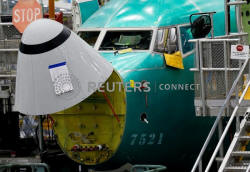Trade gloom, rising oil, Boeing 737 MAX woes to cloud
aviation summit
 Send a link to a friend
Send a link to a friend
 [May 30, 2019]
By Heekyong Yang and Tracy Rucinski [May 30, 2019]
By Heekyong Yang and Tracy Rucinski
SEOUL (Reuters) - Global airlines are
meeting under a storm pattern of trade tensions, rising oil prices and a
two-month-old grounding of the Boeing Co 737 MAX jetliner - threatening
to put a halt to five years of strong profits in the cut-throat air
travel industry.
The sector's bosses converge on Seoul for a summit this weekend, but
what might have been a celebration of growth in one of the world's most
vibrant regions now risks being thrown off course by a crippling
U.S.-China trade spat and growing environmental pressures spreading from
Europe.
"The last six months have been pretty tough for airlines," the head of
the International Air Transport Association (IATA) said ahead of the
annual meeting of the body, which groups 290 airlines representing over
80% of air travel.

"Rising costs, trade wars and other uncertainties are likely to have an
impact on the bottom line," IATA Director General Alexandre de Juniac
added.
The June 1-3 summit is a chance to examine passenger and cargo trends:
key barometers of consumer confidence and trade amid a faltering global
economy.
IATA's most recent projection for $35.5 billion in industry profits this
year now looks unsustainable due to the falling cargo market and weaker
passenger growth, and de Juniac has given a strong steer that the group
would trim the forecast at the upcoming Seoul meeting.
The cargo slump, with volumes down 3.7% in April including a 7.4% fall
in the Asia-Pacific, is a concern for big freight carriers like Cathay
Pacific and the IATA summit host Korean Air Lines.
"We have really since the end of last year seen quite a deterioration of
cross-border trade following the earlier round of tariff increases,"
IATA Chief Economist Brian Pearce said.
The meeting of some 200 CEOs is the largest gathering since the industry
was plunged into crisis over the grounding of the 737 MAX in March
following two crashes. IATA members have invested hundreds of billions
of dollars in the MAX and are anxious to contain any public or
regulatory backlash.
Aviation leaders maintain flying remains remarkably safe relative to
other forms of transport.
But the decision by China, the European Union and others to ground the
MAX before the United States opened an unusual split in the regulatory
system, worrying airlines and planemakers.
737 MAX CUSTOMER TALKS
IATA, which is taking an increasingly central role in the crisis by
hosting talks of MAX customers, believes the aircraft could return to
service in August. But that is too late to prevent significant
disruption to summer schedules.
[to top of second column] |

The angle of attack sensor, at bottom center, is seen on a 737 Max
aircraft at the Boeing factory in Renton, Washington, U.S., March
27, 2019. REUTERS/Lindsey Wasson

Pressure on Boeing grew ahead of the IATA meeting as the China Air Transport
Association estimated losses to Chinese airlines of some 4 billion yuan ($579
million).
IATA began in 1945 as a quasi-regulator and price-setter. It is now mainly a
lobbying group but retains a special role as a clearing house for financial
transactions and common standards.
Its perennial list of concerns includes high airport charges and what IATA calls
"scandalous" air traffic delays in Europe.
But it is also wrestling with a rapid surge in anti-aviation sentiment in parts
of Europe and calls in the Netherlands and elsewhere for new taxes to curb
airliner emissions.
The aviation industry says it has plans to contribute to climate efforts through
a carbon-offset scheme called CORSIA, but critics say the initiative is too
timid.
Local airlines seem to encapsulate this year's subdued tone.
Korean Air is mourning the death of long-time chairman Cho Yang-ho from a
chronic illness in April, weeks after shareholders ousted the tycoon from the
board of the country's largest airline.
The carrier, now led by his son Walter, has been receiving negative media
attention since an incident dubbed "nut rage" went viral in 2014, when Cho's
eldest daughter Heather lost her temper over the way she was served nuts in
first class and ordered the plane to return to its gate at a New York airport.

Rival Asiana's top shareholder Kumho Industrial Co said last month it was
selling its stake in the debt-laden carrier which has been slashing routes to
improve profitability.
"It seems there is not much of a celebratory mood given the circumstances at our
major carriers," said Kim Ik-sang, a senior analyst at BNK Securities.
(Reporting by Heekyong Yang and Tracy Rucinski in Seoul; additional reporting
and writing by Jamie Freed and Tim Hepher; Editing by Himani Sarkar)
[© 2019 Thomson Reuters. All rights
reserved.] Copyright 2019 Reuters. All rights reserved. This material may not be published,
broadcast, rewritten or redistributed.
Thompson Reuters is solely responsible for this content. |